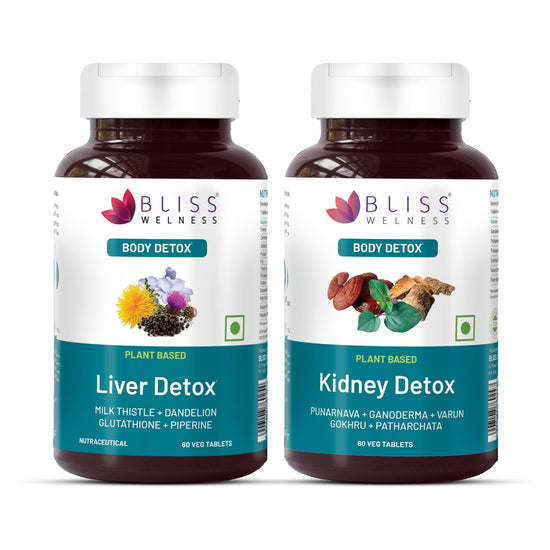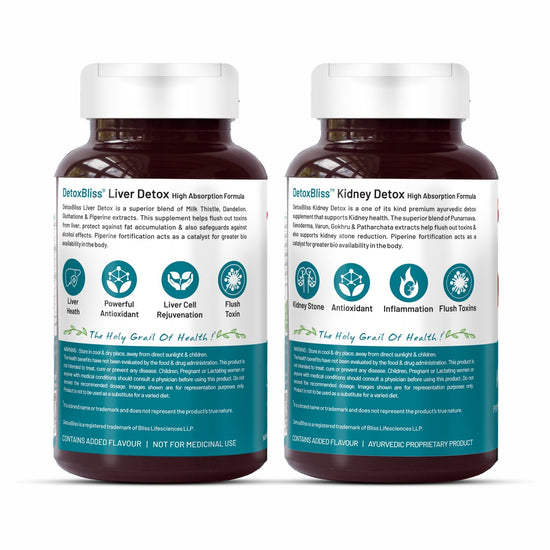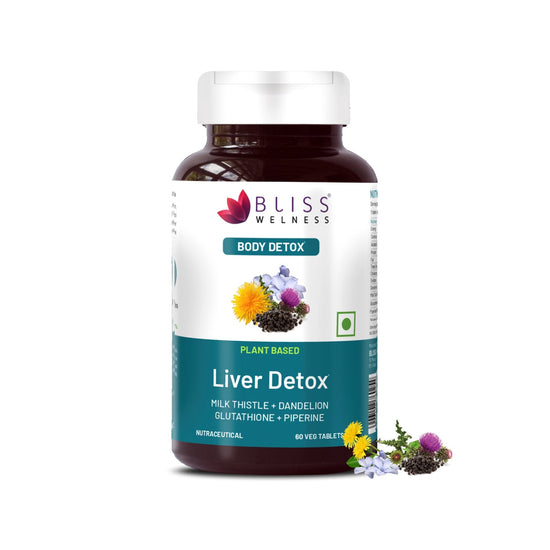2 products
-
Bliss Welness Kidney DetoxBliss Cleanse Purifier | Gokhru Patharchata Ganoderma + Liver Detox Cleanse Purifier | Milk Thistle Silymarin Dandelion Glutathione - 60+60 Veg Tablets

 Bliss Welness Kidney DetoxBliss Cleanse Purifier | Gokhru Patharchata Ganoderma + Liver Detox Cleanse Purifier | Milk Thistle Silymarin Dandelion Glutathione - 60+60 Veg Tablets
Bliss Welness Kidney DetoxBliss Cleanse Purifier | Gokhru Patharchata Ganoderma + Liver Detox Cleanse Purifier | Milk Thistle Silymarin Dandelion Glutathione - 60+60 Veg Tablets- Regular price
-
Rs. 1,121.00 - Regular price
-
Rs. 1,599.00 - Sale price
-
Rs. 1,121.00
Quick view
-
Bliss Welness DetoxBliss Liver Detox Cleanse Purifier | Milk Thistle Silymarin Dandelion Glutathione | Fatty Liver Protection Liver Care Alcohol Detox Herbal Supplement - 60 Veg Tablets

 Bliss Welness DetoxBliss Liver Detox Cleanse Purifier | Milk Thistle Silymarin Dandelion Glutathione | Fatty Liver Protection Liver Care Alcohol Detox Herbal Supplement - 60 Veg Tablets
Bliss Welness DetoxBliss Liver Detox Cleanse Purifier | Milk Thistle Silymarin Dandelion Glutathione | Fatty Liver Protection Liver Care Alcohol Detox Herbal Supplement - 60 Veg Tablets- Regular price
-
From
Rs. 706.00 - Regular price
-
Rs. 959.00 - Sale price
-
From
Rs. 706.00
Quick view
The Dandelion: Nature's Humble Healer
The dandelion, scientifically known as Taraxacum officinale, is a ubiquitous plant often considered a pesky weed. However, beneath its unassuming yellow blossoms and fluffy seeds lies a powerhouse of nutrition, medicinal properties, and cultural significance. In this comprehensive guide, we'll explore the multifaceted world of dandelions, shedding light on their uses, nutritional benefits, and historical importance.
The Dandelion Chronicles
1. From Weed to Wonder
For generations, dandelions have been viewed as unwelcome invaders in manicured lawns. Their ability to thrive in diverse climates and colonize landscapes rapidly has earned them a reputation as common weeds. However, it's time to reconsider this perception.
Insight: Dandelions have a rich history of human use, dating back centuries in traditional medicine and culinary traditions.
2. A Culinary Adventure
Surprisingly, nearly every part of the dandelion plant is edible and offers a unique flavor profile. From its slightly bitter leaves to its golden flowers and nutritious roots, dandelions have been featured in culinary creations worldwide.
Insight: Dandelion greens are a staple in many salads, providing a peppery bite and a boost of vitamins.
3. Nutritional Treasure Trove
Dandelion leaves are a nutritional treasure trove, brimming with essential vitamins and minerals. Their abundant reserves of vitamins A, C, and K contribute significantly to overall health and well-being.
Insight: The dandelion's nutritional value rivals that of spinach and kale, making it a superfood in its own right.
Healing with Dandelions
4. Traditional Remedies
Dandelions have been used in traditional medicine to alleviate various ailments, including digestive issues, joint pain, and skin conditions.
Insight: The plant's roots and leaves are believed to possess anti-inflammatory and antioxidant properties.
5. Supporting Digestion
The bitterness of dandelion greens can stimulate digestion by increasing the production of digestive enzymes. This natural property has made dandelion a popular choice for those seeking digestive remedies.
Insight: Dandelion tea is a soothing and effective way to ease digestive discomfort.
Cultivating a Relationship with Dandelions
6. Growing Dandelions
For those interested in reaping the benefits of dandelions, cultivating them in your own garden is a sustainable and rewarding endeavor.
Insight: Dandelions are hardy and require minimal maintenance, making them an excellent addition to any garden.
7. Harvesting and Preparing Dandelions
Learn how to ethically and sustainably harvest dandelions, as well as prepare them for culinary and medicinal purposes.
Insight: Dandelion roots can be roasted and ground to create a caffeine-free coffee substitute.
Frequently Asked Questions
FAQ 1: Is it safe to eat dandelions from my yard?
Yes, as long as your yard has not been treated with pesticides or herbicides. Always wash dandelion greens thoroughly.
FAQ 2: Can dandelions help with allergies?
While there is no scientific evidence to support this claim, some individuals believe that consuming local honey containing traces of dandelion pollen may help alleviate allergies.
FAQ 3: Are dandelion supplements available?
Yes, dandelion supplements in various forms, including capsules and teas, can be found in health food stores.
FAQ 4: Can I use dandelions to make natural dyes?
Absolutely! Dandelions can yield vibrant yellow and green dyes for fabric and Easter eggs.
FAQ 5: Are there any side effects associated with consuming dandelions?
In general, dandelions are safe to eat, but some people may experience allergies or digestive discomfort. If in doubt, consult a healthcare professional.





